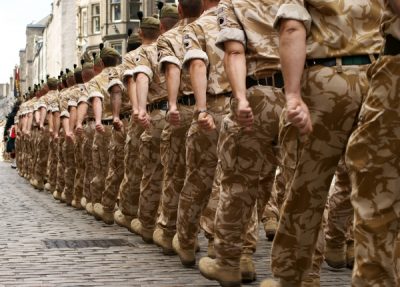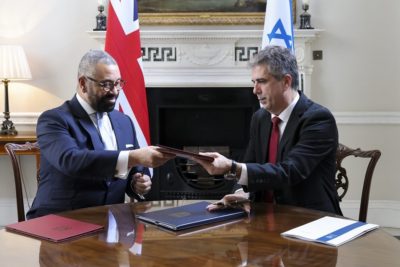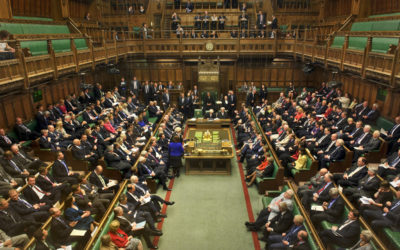The case for unionising the army

The military’s internal complaint systems is unfit for purpose, comprising ‘investigation of the MOD, by the MOD, for the MOD’. It is ‘fundamentally dysfunctional’ and ‘not only ineffective but counter-productive’. Beyond the system’s ‘veneer of fairness’, proper operation of the system is made impossible by a military institution ‘blinded by rank and culturally unable to decide complaints fairly’.
The system, in some cases, is so decrepit as to throw up situations for service personnel so ‘nightmarish’ that ‘Kafka could not conceive [them]’. It leaves the MoD with ‘no incentive to change the status quo’ and preserves intact the military’s ‘unconscious predisposition to isolate, exclude and punish complainants’.
The system, in some cases, is so decrepit as to throw up situations for service personnel so ‘nightmarish’ that ‘Kafka could not conceive [them]’.
This is not a critique offered by a liberal NGO – though the Liberty ‘Second Rate Justice’ report, which slammed various aspects of the military’s institutional and legal culture, came to broadly similar conclusions. Rather, these are the words of two ‘company men’, senior officers with long careers in the RAF and British Army respectively, one retired, the other a regular soldier turned reservist. Major Ross Macleod and Wing Commander Graham House served for decades. Their written evidence to the Defence Select Committee’s inquiry into the work of the Service Complaints Ombudsman is struck through with a real desire to improve the lot of service personnel.
Both officers note that UK military personnel, unlike normal workers (soldiers, sailor and airmen are excluded from the legal definition of workers) cannot organise collectively. Not even along the union-lite lines of the police and prison federations which, critically, cannot withdraw their labour and strike. Both appear to recognise that this leaves military personnel uniquely vulnerable to the excesses of their bosses. However, neither calls for a union or federation. Even one along the lines of those which are common in a number of allied nations in Europe such as the Netherlands, where there is a long tradition of military trade unionism – a fact which has not stopped Dutch troops fulfilling their operational role in, for example, Afghanistan.
The barriers against unionisation
Beyond the legal limits on personnel raising their own defence there are other barriers. For example, generals and politicians have long argued – though never very convincingly – that allowing soldiers, sailors and airmen to defend their rights and pursue their needs would be to hand them a licence to mutiny. Alongside senior officers there are a galaxy of charities, including the Royal British Legion (itself the result of an amalgamation of post-WW1 veterans unions) and family associations who claim the welfare of serving personnel is their remit. Additionally, while the existing British Armed Forces Federation (BAFF) rejects the idea that the ‘military trade union question’ hinges on ‘fantasy activities such as “going on strike”or “voting on battlefield decisions”‘ it has always taken the position that ‘traditional trade union status would not be the right format for a body representing British armed forces personnel.’
Yet the fact remains even the most recent iteration of the service complaints system has been subject to serious criticism for some time. In 2006, the deaths of four young soldiers at Deepcut barracks led to serious concerns about the complaints process and external oversight. A Commissioner was created to help personnel access the complaints system and report annually to Parliament. Every report from 2008 – 2014 criticised the efficacy and fairness of the system and said the commissioner didn’t have enough power to change things. New reforms were therefore announced, including streamlining the complaints process and introducing the Service Complaints Ombudsman (SCO) who started 1 January 2016.
Despite these numerous reforms and changes, the system is still not fit for purpose.
Evidently, despite these numerous reforms and changes, the system is still not fit for purpose. Yet despite the failure of the service complaints system and the SCO, neither generals nor welfare organisations nor BAFF have suggested any coherent alternatives for personnel beyond put up and shut up. This is despite the fact that the real-world issues facing service personnel (problems which the various incarnations of the SCO have failed to address) are things like pay, benefits, housing, health and safety at work, rife bullying and discrimination: bread and butter issues for a union or federation.
Unions are the most basic self-defence mechanism for working people and self-organisation has been the main historical driver for increase in standards of pay, conditions and quality of life. Amnesty International says: ‘The right to form and join trade unions, to collectively bargain and to strike are universal human rights.’ This ‘human rights’ element is key – the British forces, devoid of a union and stuck with the military’s internal and inadequate complaints system, were this year considered so poorly treated by the system that charity Liberty set up a human rights helpline.
Unions are the most basic self-defence mechanism for working people and self-organisation has been the main historical driver for increase in standards of pay, conditions and quality of life.
This issue of rights is especially pressing at the moment given that the current Conservative government is trying to pin back, rather than deepen, soldiers’ and military families’ rights by attempting to derogate from the European Commission on Human Rights (ECHR) while framing the move as an effort to protect soldiers from legacy prosecutions such as those which have merged from Iraq, Afghanistan and Northern Ireland. It may be of note here that the ECHR ruled on a case in France in 2014 that while certain limitations on military trade unionism were reasonable, denying it entirely contravened human rights law. Also notable in the French case is that one of the driving issues behind the initial ruling was a high occurrence of military sexual assaults, a problem the British military, too, appears entirely unable to resolve through internal processes.
The reality is that an internal system handling complaints can never truly serve the best interests of personnel, as the needs of the military will always ultimately come first. At the second inquest for Geoff Gray, which concludes this week, and who was 17 years old when he died at Deepcut barracks, an officer admitted that the needs of the Army come before the needs of individual recruits when it comes to welfare.
The reality is that an internal system handling complaints can never truly serve the best interests of personnel, as the needs of the military will always ultimately come first.
Some politicians have recognised that the issue is worthy of consideration. The SNP’s Martin Dochertyt-Hughes formulated an Armed Forces Representative Body Bill and started pushing for a debate on the topic in June 2018.
Interviewed by The National newspaper in March he argued that:
‘My Bill is entirely focussed on the interests of service personnel and their families – which I believe are best represented when they speak with one strong voice, and on issues like the 1% pay freeze, or ongoing worries about the state or service accommodation, it would be a vital step to ensure that armed forces personnel can improve their working and economic conditions.’
The same piece captures something of the struggle between stakeholders, with the Naval Families Federation arguing: There are a number of mechanisms in existence outside the armed forces that advocate on behalf of serving personnel such as the Armed Forces Pay Review Body (AFPRB), the Service Complaints Ombudsman (SCO), the Forces Pension Society (FORPEN), the Royal British Legion (RBL) and the Families Federations (FamFeds). The Naval Families Federation insisted that no serving personnel and families had raised a ‘need for an overarching statutory representative body.’
Prospects
Most of the bread and butter issues facing military personnel would be best resolved by a union-type organisation. Initially this is most likely to be a federation without the right to strike (definitions discussed here). Opposed to the advancement of military personnel’s condition are generals, on the basis of a series of discredited arguments, and family federations and charities who claim to be able to provide some of the functions of a union. A number of militarily active NATO allies already have unions and federations with no apparent effect on operational capacity.
A small number of individual politicians, veterans and organisations recognise that something is seriously amiss in the UK military which current processes cannot address. A section of these are in favour of deepening and expanding military personnel’s rights and allowing them to organise to do so. ForcesWatch is among them.
See more: human rights, terms of service, unionisation
Like what you read?
> Sign up for our newsletter or blog notifications
> Support our work – from just £2 a month









